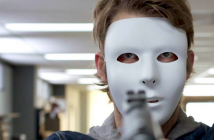
Cast: Harrison Ford, Asa Butterfield, Hailee Steinfeld
Director: Gavin Hood
Country: USA
Genre: Action | Adventure | Sci-Fi
Official Website: Here
Editor’s Notes: Ender’s Game is now open in wide release. For an additional perspective, read Derek’s review.
Ender’s Game (2013) isn’t much like any sci-fi picture that’s ever really been made. First of all, it focuses on the training of children to be commanders in a war against a former invading extra-terrestrial force. Really, that’s the big difference. The mental and physical torture that these children, especially the ‘chosen one’ Ender Wiggin (Asa Butterfield) is at times difficult to watch.
The reason for children, we are told by Colonel Graff (Harrison Ford), is that children and young adults can process and absorb complex pieces of information faster than adults and can think more imaginatively, giving the enemy someone they cannot predict. Human kind was attacked 50 years previous by an insect-like race and nearly destroyed. One pilot figured out how to take them down, took a risk and it paid off and ever since, they have been looking for another commander who could do the same thing.
Ender’s Game (2013) isn’t much like any sci-fi picture that’s ever really been made. First of all, it focuses on the training of children to be commanders in a war against a former invading extra-terrestrial force. Really, that’s the big difference.
Graff sees something in Ender that he admires: tactical ability to defeat his enemy with the empathy to understand and love them. He is severe in his attacks so that he not just wins that battle, but prevents the thought of future ones. Graff sets of to test Ender in the most extreme ways possible to see if Ender can be the commander he’s been searching for.

I’ll be honest, the script does have some problems. We are told the story of Mazer Rackham, the hero pilot, three or four times throughout the course of the first 45 minutes. By that point, we know it by heart like the cadets. There is also a question of timing that plagued me throughout the whole picture. This training is taking months or possibly a year or two and at one point we see a screen that has the enemy fleet out only 28 days. This is seen before the months of command training that Ender receives. It felt a lot like looking at the Death Star clock in Star Wars Episode IV: A New Hope (1977) that didn’t match at all with the vocal countdown on the station or in the Rebel base. The reveal at the end (which I will not spoil here for those of whom, like me, have not read the book) may help to explain this discrepancy, but it was still a little confusing.
There are also problems with the characterization and relationship development throughout the film. Some people immediately want to help Ender while others just as quickly want to destroy him. Writer/director Gavin Hood (previously responsible for directing the terrible X-Men Origins: Wolverine and writing and directing the stupendous Oscar winning Tsotsi) relies on archetypal shortcuts for most of the supporting cast, focusing all of his efforts on making Ender a three-dimensional character, which he succeeds in doing but when only one character out of a dozen is well defined, it makes the proceedings somewhat difficult.
As a director, Hood shines though. He creates a wonderful visual aesthetic for the film, making it look shiny but lived in. He does some impressive things with the camera during the 0-G sequences that make you feel like you’re floating along with Ender and his team.
As a director, Hood shines though. He creates a wonderful visual aesthetic for the film, making it look shiny but lived in. He does some impressive things with the camera during the 0-G sequences that make you feel like you’re floating along with Ender and his team. He keeps Ender visibly away from most of his other cadets so you can see the isolation he is feeling. Even after he starts making a name for himself as a commander and people are becoming his friends, there is a distance between them even if it is subtle. Hood works at keeping his visual flair in keeping with the action on screen and never sacrifices tone for style. If the tone feels a bit cold to some, that’s because it is and it is supposed to be. Ender is an emotional kid, but with an icy exterior and a cold streak of violence in him that prevents us from fully embracing him. This tone helps establish Ender as a commander, because if Star Trek (1966) and its various films and spin-off shows have taught me anything it’s that the Captain’s chair is the loneliest one in the room.
That brings me to the actors, specifically Butterfield. At only 16 years old, he is already establishing himself as a powerhouse actor. After his stellar performance as Hugo Cabret in Martin Scorsese’s great Hugo (2011), he shows up here as Ender carrying the film again. Butterfield’s talent can be seen here in the way he can play emotionally distraught and seething anger within moments of each other. The cold look in his eyes when he is kicking a bully after he’d already gotten him down, followed by the fear in them while he threatens the lackeys seconds later is proof positive of his ability. He shows off quite a bit of range in this performance and it puts the audience on his side even when we may not really want to be.
Harrison Ford also brings a lot to his role of Graff, who is kind of a natural extension of Han Solo if he were ever to become a military trainer. His desire to eradicate the threat of a second invasion blinds him to all of the things that makes humanity worth saving and we really start to wonder if this exercise is completely worth it if he is what humanity may have become.
The big travesty in the film is Viola Davis as Major Anderson. It’s not a travesty that she’s in it or that she does a bad job, that’s not it at all. It’s that she’s given so little to do and is so sidelined that it almost wasn’t worth her time to be in the film. She’s an incredible actress and she deserved to have a more fleshed-out role and a more important one. Same with Ben Kingsley, who doesn’t even show up until the last third of the film. He’s great, but wasted.
Ender’s Game isn’t a masterpiece and it has some problems, but what it has going for it is how entertaining it is. The story is engaging, the look is great and everyone in the film gives it their all, whether they are in it long or not. The film eschews most of the normal teen angst that pervades teen-centric films and replaces it with a desire to save the earth and their families. These kids don’t even fully realize what they’re doing, let alone how important it is and how devastating it can all be. Ender’s Game ends poorly, but I suspect that’s just because there is a massive library of literary sequels waiting to be mined for the big screen and if they are done this well, I may not mind that at all.
[notification type=”star”]80/100 ~ GREAT. Ender’s Game isn’t a masterpiece and it has some problems, but what it has going for it is how entertaining it is. The story is engaging, the look is great and everyone in the film gives it their all, whether they are in it long or not. The film eschews most of the normal teen angst that pervades teen-centric films and replaces it with a desire to save the earth and their families. [/notification]



